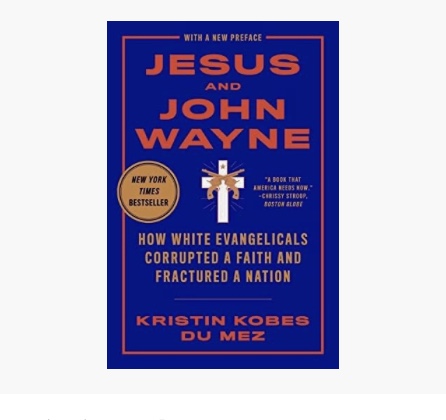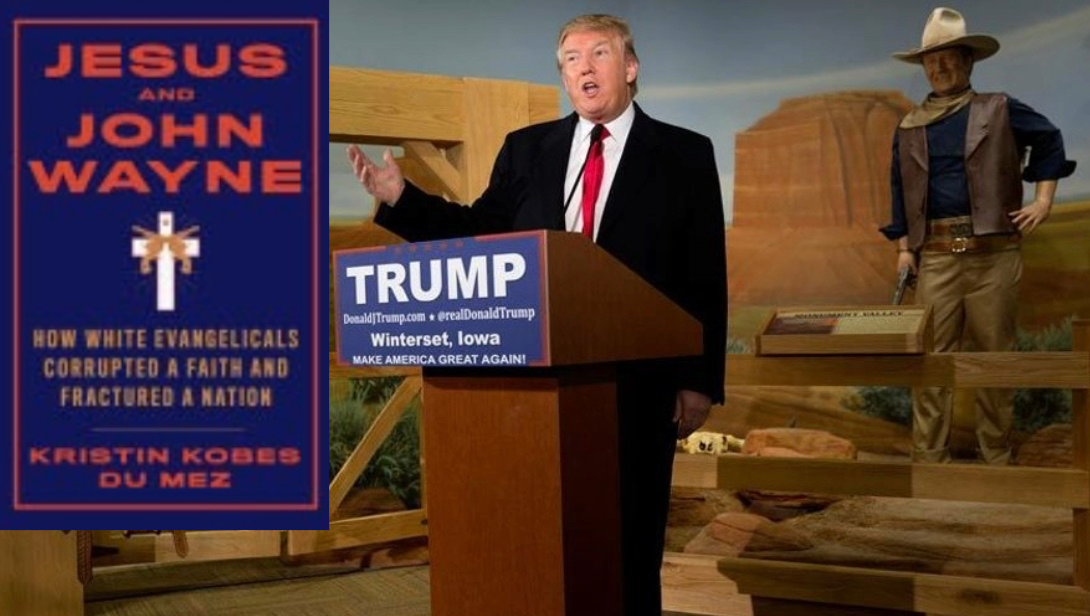Jesus and John Wayne: How White Evangelicals Corrupted a Faith and Fractured a Nation Authored by, Kristin Kobes Du Mez, offers a unique perspective on modern American politics through the lens of symbolism—particularly Christian (Jesus) militant masculinity (John Wayne)—and how it influences US politics. What amazed me most was how something like “masculinity” could shape a political outcome. One of the book’s most interesting insights was the power of Christian militant masculinity—not just as an abstract idea but as a political force. The image of the strong, dominant male is deeply embedded in the evangelical Christian worldview, and so is American culture, and it plays out in elections, policy decisions, and culture wars.
Book Review
Something that stood out to me is how laws designed to protect women—like domestic violence legislation—can threaten religious institutions that embrace patriarchal values. For many of us, empowering women feels like common sense—fundamental equality. But within certain conservative Christian circles, these laws challenge the notion of a subservient woman. They give her the power to strike back, metaphorically and literally. That flipped a switch for me. It made me stop and think: Why do we have such a visceral reaction to change? And what does that say about our political positions?

Jesus and John Wayne: How White Evangelicals Corrupted a Faith and Fractured a Nation
This quote hit hard: “The domestic violence prevention and treatment act was especially insidious, for it would do away with ‘physical punishment as a mode of childrearing’ and ‘eliminate the husband as head of the family.'” (Kobes Du Mez, 2020, p. 97).
Evangelical Masculinity and Gender Roles
Another compelling thread in the book is how the shift from a manufacturing economy to a service-based one reshaped masculinity. When service jobs grew after the 1980s, so did the idea of ‘servant leadership, a management philosophy where the leader’s primary role is to serve their team, empowering and enabling them to perform at their best.
“…service work took over a larger share of the labor market, and servant leadership helped redefine masculine authority…” (Kobes Du Mez, 2020, p. 153)
That’s a big deal. Our economy doesn’t just change where we work—it changes how we think, how we lead, and what we value. This perspective reflects current events. For example, Trump’s push to bring back manufacturing is more than economic. It’s cultural. It’s about reclaiming a lost form of masculinity—brawn over brains.
I stress the impact of this author’s insights. This provided me pause to reflect on how much modern policy is rooted in male insecurity, such as the opposition to green policies. This unspoken link between femininity and electric cars, clean energy, and sustainability is wrapped in identity politics. The association of these progressive ideas with femininity is often used to undermine their credibility in conservative circles, perpetuating a narrative that these issues are not ‘manly’ enough.

Bullet Point Takes
Women Reinforcing Patriarchy:
We all know the stereotype of the evangelical male preacher. But this book also reminded me how female evangelical leaders have upheld the same patriarchal values. Phyllis Schlafly and Beverly LaHaye played major roles in reinforcing a “submissive woman” ideal. The author sums this point up nicely: “Family values politics was about sex and power” (Kobes Du Mez, 2020, p. 88).
Christian Militancy and Foreign Policy:
The book also discusses how Christian militancy bleeds into foreign policy. There’s a long-standing belief that we must spread Christianity, sometimes through force—conquering in the name of God. That mindset shapes not just religious culture, but national policy. It’s embedded.
Abuse and Silence:
I’ll admit that I was ignorant about the scale of sexual abuse and domestic violence within evangelical circles. We all remember the headlines from the Catholic Church, but I don’t recall the same outrage or attention around evangelical abuse scandals. Why is that? Why the silence? I’m still sitting with it—and honestly, I’d love to hear your thoughts on it too.
Influencers are the Modern Day Preacher:
Although this insight is my own, the author led me down a garden path to it. The preacher passed the basket; influencers collected tips and patrons. The preacher stands at the pulpit preaching to their congregation while the influencer sits at a desk preaching to their followers. It’s wild how we separate these roles in our minds—”he’s a spiritual leader” vs. “she’s just an influencer”—but essentially, they’re both selling a message, a lifestyle, and collecting devotion. Read more of my thoughts in my article on the topic here.
The Massive Evangelical Christian Media Machine:
I was also shocked by the size and influence of the evangelical media ecosystem. Books, music, newsletters, television, and radio networks are massive. And it’s been around for over a century. For example, the NAE (National Association of Evangelicals), NRB (National Religious Broadcasters), CCC (Campus Crusade for Christ), CBA (Christion Booksellers Association), PTL (Praise the Lord Network) and Focus on the Family, You might not even realize it exists if you’re not part of that world. But it shapes millions of minds.
I remember watching that South Park episode years ago, in which Cartman formed a Christian rock band to make a ton of money. Twenty years later, I finally grasped Matt Stone and Trey Parker’s point. It’s not just satire—it’s a profound commentary on a real, powerful machine that I was oblivious to.
Favorite quotes:
· “[Eisenhower] made the connection explicit: a strong military would keep the Americans free to worship their God” (Kobes Du Mez, 2020, p. 35).
· “As religious leaders like Hyles championed a militant application of patriarchal authority, other conservatives, too, embraced a nostalgic vision of aggressive, even violent masculinity. In this way, militant masculinity linked religious and secular conservatism” (Kobes Du Mez, 2020, p. 54).
· “The money followed. By 1987, Focus on the Family had developed into ‘a full-blown evangelical media empire’ with a budget of around $34 million; by 1995 the budget surpassed $100 million” (Kobes Du Mez, 2020, p. 85).
· “Fundamentally, evangelical ‘family values’ entailed the reassertion of patriarchal authority. At its most basic level, family values politics was about sex and power” (Kobes Du Mez, 2020, p. 88).
· “The idea of ‘servant leadership.’ Less abrasive than ‘male headship,’ servant leadership framed male authority as obligation, sacrifice, and service” (Kobes Du Mez, 2020, p. 153).
· “Gender was also a key factor in shoring up support for the unconventional, morally challenged candidate, Donald J. Trump” (Kobes Du Mez, 2020, p. 251).
My only criticism was that the book’s critiques sometimes became repetitive. I get it—the author is making a strong case, and she backs it up with a mountain of evidence. I must say, I deeply respect her thoroughness and the convincing case she presents.
In summation, this fantastic book led me to question the motivations behind my beliefs and gave me valuable insights into today’s society. If you are interested in these topics, you can purchase a copy of the book here. I am an Amazon associate. Your purchase via. The link helps promote my work at no cost to you.

Jesus and John Wayne: How White Evangelicals Corrupted a Faith and Fractured a Nation
Thank you for your support and let’s continue to MAKE READING GREAT AGAIN!
Follow us! 🌐 ToSpeakOnline.com | 📺 YouTube Channel | 🎙️ Spotify Podcast | ✉️ Newsletters | TikTok | Instagram | Twitter/X | Facebook | All My Links | Partners & Associations
Written by: Charles L Randolph




